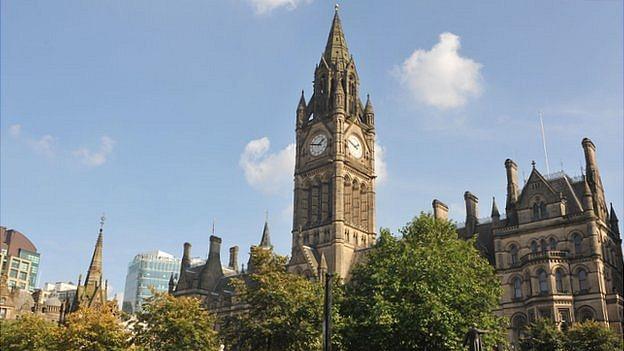Do England's cities want devolved powers?
- Published
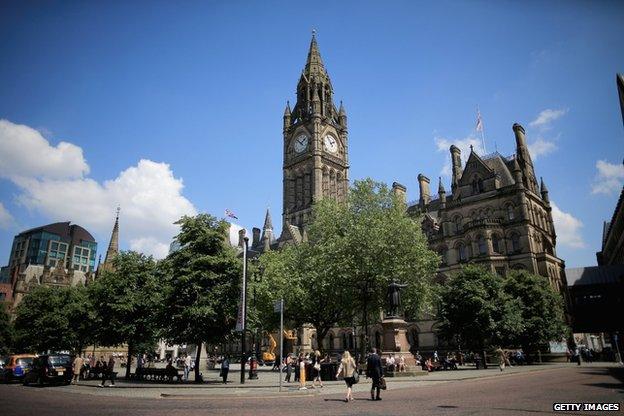
Manchester would become a blueprint for other large cities under the devolution plans
England's major cities could be in line for sweeping new powers if they sign up for the government's devolution revolution - but is it wanted?
George Osborne believes the "old model" of running everything from London is "broken" and has unbalanced the economy.
So in his first post-election speech, the chancellor has set out plans for English cities to have greater powers over housing, transport, planning and policing - making Greater Manchester a blueprint for other large urban centres.
What do the people who live in these great cities - and the politicians who currently run them - think?

Birmingham
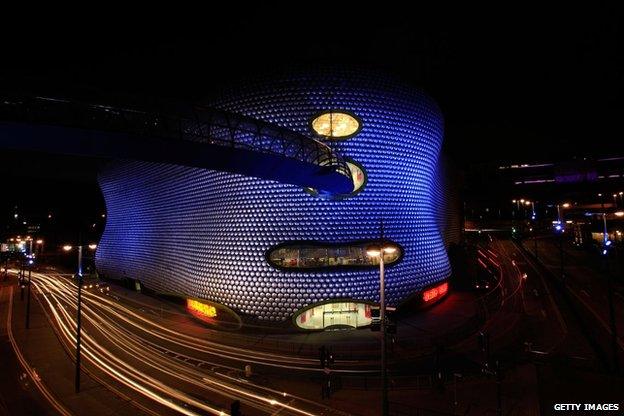
Birmingham City Council is a Labour-run authority responsible for a population, according to the latest estimate, external, of 1,085,400.
It is a growing city, with the population increasing 10.2% since 2001, attributed to more births, fewer deaths and international migration.
The city is also young, more than 45% of Birmingham residents are under 30 - across England the average is 36.8%. There is a bulge around the 20-24 age group, mainly due to students coming to the city's universities.
A workplace employment survey in 2013 showed the majority of people - 34% - were employed in public services, which includes education, health and public administration. The second biggest sector was retail and leisure, with 25% of people employed in this sector.
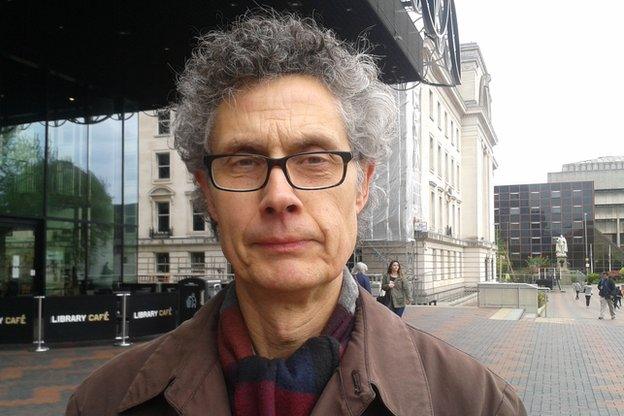
Nigel Leyland does not want "more bureaucracy"
Nigel Leyland, who is from Birmingham and retired, believes the city does not need "an elected mayor and another kitchen cabinet".
"What we need is a council which is empowered to spend the right amount of money for this city and the government needs to make sure that we get the right amount of money and they're not doing that," he said.
"I don't want more bureaucracy. I want more effective responses to local needs and we're not getting that because the government is penalising us [Birmingham] for being Labour.
"I think it's another Tory joke, a bad joke."

Robert Alden said the devolution plans had cross-party support in Birmingham
The Midlands region has not, in the past, called for devolution with the same urgency as the north.
But Robert Alden, leader of the Conservative group in Birmingham, said the devolution plans had cross-party support there.
"There has not been a clamour for a regional assembly - people do not want another layer of bureaucracy," he said.
"But there is a call for Birmingham to have more financial powers. In the past, the city was a shining example of municipalism.
"It's been unacceptable for places like Scotland to get offered more powers while Birmingham - one of Britain's regional powerhouses - gets ignored."
He said there were a number of options for the areas West Midlands devolution could cover, which may or may not include Birmingham, Wolverhampton, Coventry and their surrounding areas.
"The city has a really great story to tell," he said. "It was at the heart of the industrial revolution and we have continued that history of manufacturing excellence throughout."

Bristol
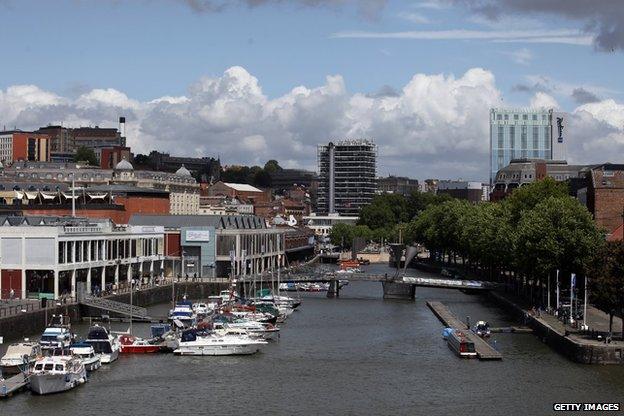
Bristol City Council is led by a mayor who is elected by voters along with the council's 70 councillors.
The current mayor, George Ferguson, has no party political affiliation. Of the 70 councillors, 30 are Labour, 16 are Conservative, 13 are Green, 10 are Liberal Democrat and 1 is UKIP.
The population of the Bristol local authority area was estimated to be 437,500, external in 2013.
Population declined in the post-war years then stabilised in the 1990s, but is estimated to have increased by 11.8% between 2003 and 2014, external - higher than the average 7.7% increase for England and Wales.
Population growth has been particularly concentrated in central areas of Bristol.
Key sectors include aerospace, insurance, retail banking, creative industries, and higher and further education.
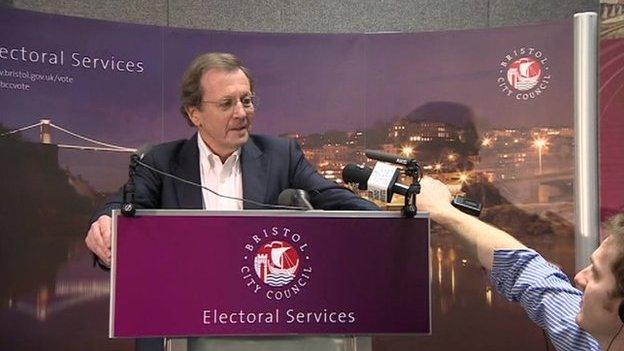
Bristol already has an elected mayor, currently George Ferguson
Bristol's mayor George Ferguson is in favour of the the Cities Devolution Bill.
"It is time for us to modernise and move away from being one of the most centralised countries in Europe," he said.
"As Britain's main drivers of growth, our cities are severely hampered by having too few financial and legal freedoms and receive far too little of the benefit of their actions."
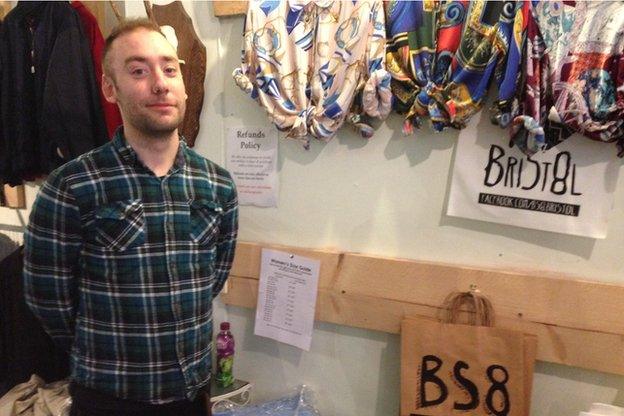
Mr Snook hopes Bristol's transport system would be improved under devolution
Mr Snook, from Stokes Croft in Bristol, said he "can't see the benefit of people sitting behind a desk in London, making judgements on cities they have no knowledge about".
"Personally I think each county should be able to have its own powers, you should be able to have more direct influence over its hospitals, public transport and public services generally," he said.
"I find it very difficult to grasp the concept of how someone in London can have an idea of how any other city, apart from London, can be run. London itself is a separate entity."
He hopes Bristol's transport system would be improved under devolution.
"The transport in Bristol is an absolute sham," he said.

Leeds
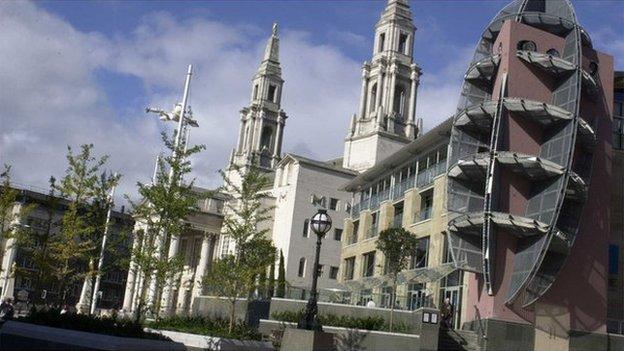
Leeds City Council is a Labour-led authority overseeing a population of 751,500, according to the 2011 Census.
The population has risen slower than many other areas. It rose 5.1% between 2001 and 2011, which was less than the average 7.1% increase for England and Wales.
The biggest employment sector in 2013 was finance and business services, which employed 30% of people.
The second biggest was public services, which employed 26% of people, followed by wholesale and retail, in which 13% of people were employed.
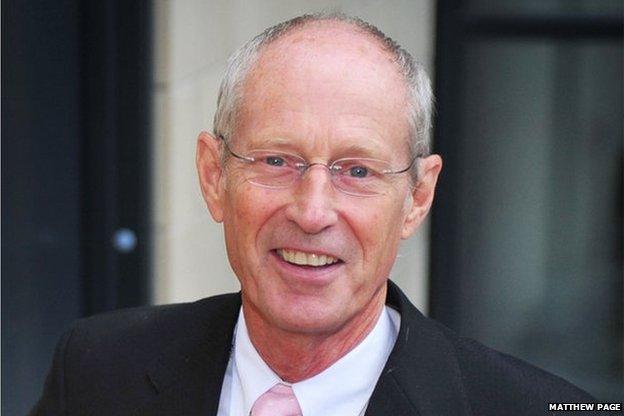
Peter Box said more detail is needed from George Osborne
Councillor Peter Box, who is chairman of the West Yorkshire Combined Authority, pointed out there has been opposition to elected mayors in the past.
"There has been a referendum in Leeds, Bradford, Wakefield and Kirklees and all of those referendums gave a resounding no to an elected mayor," he said.
However, he said the position was now changing.
"We have been told if we want more devolution an elected mayor is the only option and clearly there's a decision to be made on whether we remain as we are with the devolution we've been given already, or seek to gain more devolution," he said.
"There are two issues. Firstly, we need to find out the detail from George Osborne in terms of extra power and resources.
"Secondly, once we know that we need to go out to the public, businesses and organisations that would be affected and ask what are their views. Once we know the answer to that we can go back to George Osborne."
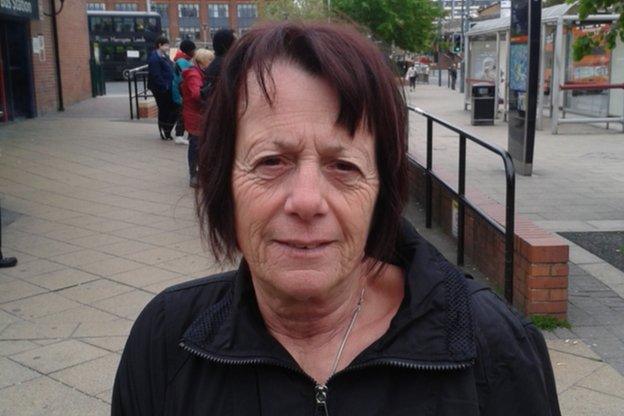
Susan Sutton thinks devolution could help money be directed to where it is needed most
Susan Sutton lives in Bradford but would be in favour of devolution for Leeds, where she regularly visits.
"I think it's a good thing because there are certain issues that belong locally that central government probably wouldn't understand in the way that people in northern England would," she said.
"Devolution is a good idea so that local policies can be put into place. More money would be directed to where it's needed most.
"People are different and we've got different needs to other parts of the country, so I think we would see improvement where needed."

Newcastle
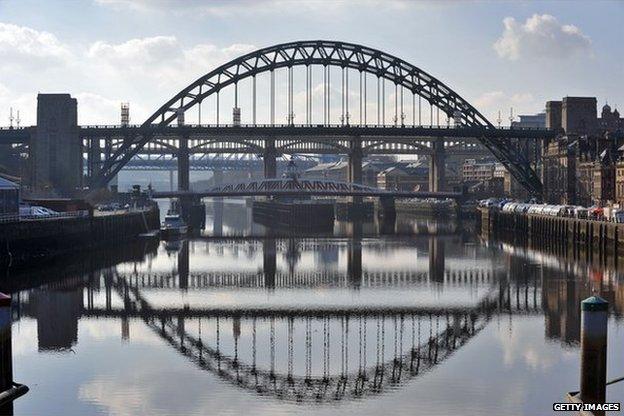
Newcastle City Council is a Labour-run authority.
The population of Newcastle upon Tyne was 280,200 according to the 2011 Census. It increased 5.3% between 2001 and 2011, which was less than the average 7.1% increase for England and Wales.
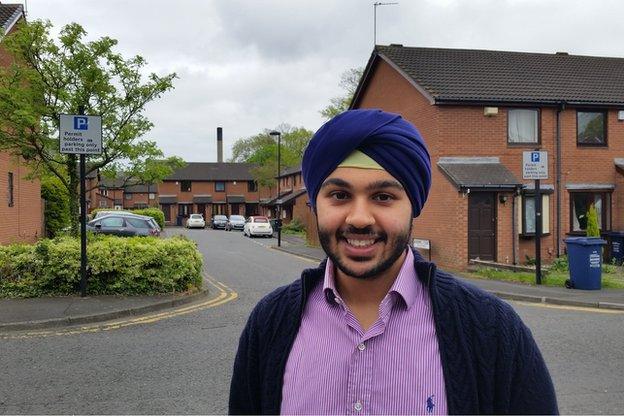
Charan Thandi believes devolution could help address local problems such as transport
Newcastle medical student Charan Thandi, 23, is in favour of handing more power to local politicians.
"I feel having an elected mayor and more local accountability would be beneficial," he said.
"Newcastle is a big, developing city and I think a mayor would be a move that would be positive and important and allow local communities to contribute more to what's important."
He said one of the biggest issues in the city is transport and the lack of parking, especially in the centre of the city.
"I'm a student and I know it's a problem for me and a lot of my friends," he said.
"I think having local devolution could be one way of addressing these problems and we would have more accountability. But any mayor would have to be someone who had experience and knew the area well."
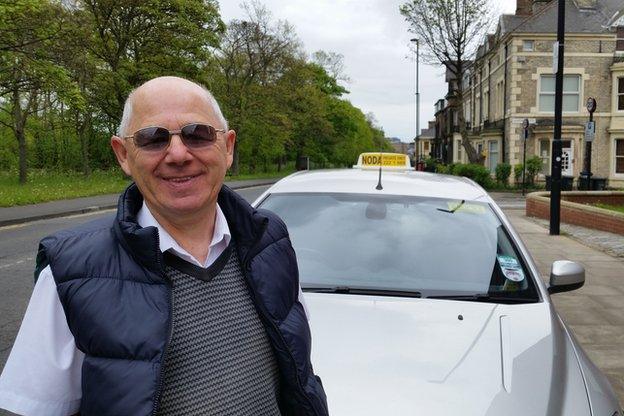
Taxi driver Bob Vint said he would rather have a dictator if they would be "better at running the place"
Bob Vint, a 56-year-old taxi driver of 20 years from Newcastle, has little faith in the benefits of regional devolution.
"All these politicians are the same and I don't think things would be any better or worse than they are now," he said.
"It's like all these Euro MPs, they're just a strain on society and it sounds to me like all this would be just be another layer of bureaucracy and red tape.
"If I thought a dictator would be better at running the place I'd rather have that."
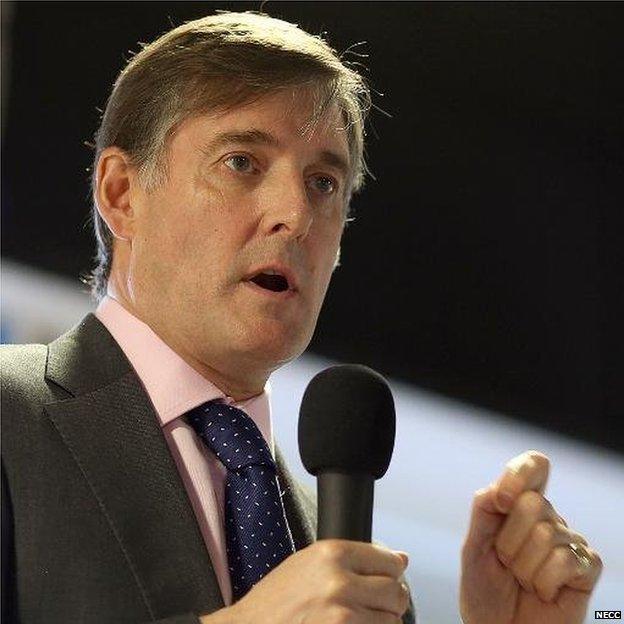
James Ramsbotham said the region "desperately" needs an individual or organisation to lead it
But James Ramsbotham, chief executive of the North East Chamber of Commerce, said the region "desperately" needed something that unites it.
"Local authority leaders are not elected to do any more than look after their local authority area, so we've got to come up with some other way that really encourages people to take responsibility on an original level," he said.
He said "big things" like health and skills and infrastructure need to be done over a bigger scale than individual local authority areas."
"I think we desperately need somebody to be a leader, whether it needs to be an individual or whether it needs to be some organisation, I don't think that's for me to say.
"But we desperately need something that really unites the region and speaks right the way across for every single person who lives here in the North East."

Norwich
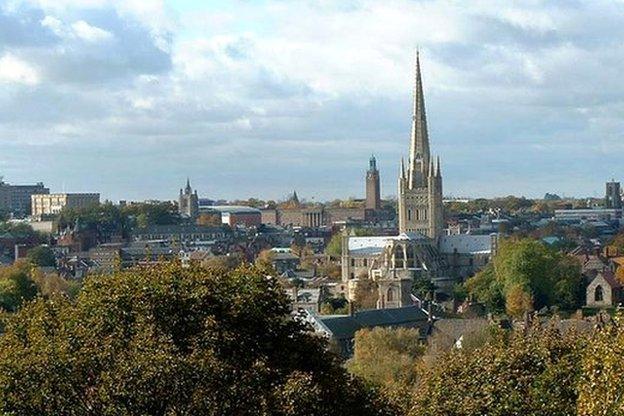
Norwich has been proud of its role as the leading city in the region - being the second largest city in England from medieval times into the 18th Century.
Norwich City Council is a Labour-run authority. Labour holds 21 seats, the Green Party has 15 and Liberal Democrats have three.
The population was 132,500 according to the 2011 Census.
The economy is now service-based, but historically it centred around the manufacturing industry. This included shoemaking, textiles and chocolate production.
Plans in 2007 to give Norwich wider powers were thwarted by the High Court in 2010. The court ruled that the government had ignored official advice that the city did not fit the criteria for unitary status.
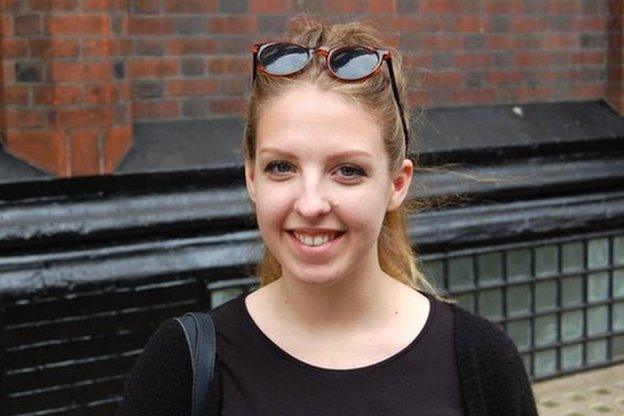
Norwich textiles student Lottie Travis believes more power for city could help improve cycle paths
Lottie Travis, 21, a textiles student at the Norwich University of the Arts, said more power for Norwich could boost its support for the arts.
"It's quite an arty place and with more control it could give more support to arts events. It has a lot to offer as a model of a cultural city," she said.
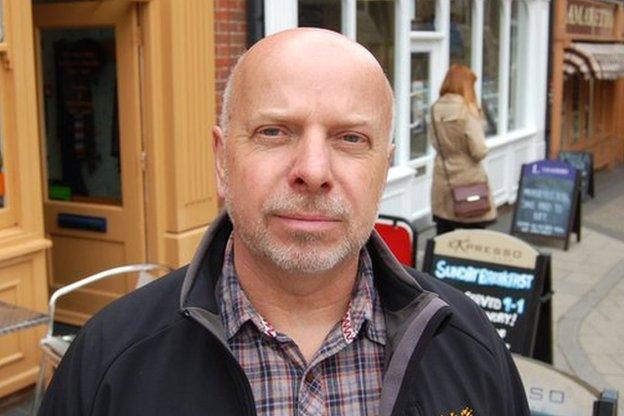
Roy Green, 60, of Thorpe, believes power is better concentrated at a local level
Semi-retired supermarket worker Roy Green, 60, of Thorpe, in Norwich, said if local councillors had more power "they could promote the area better, rather than being governed from Westminster".
They could "improve the quality of life in the city" and improve road links.
- Published14 May 2015
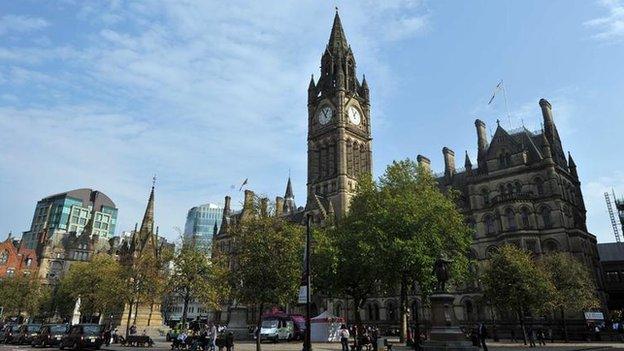
- Published14 May 2015
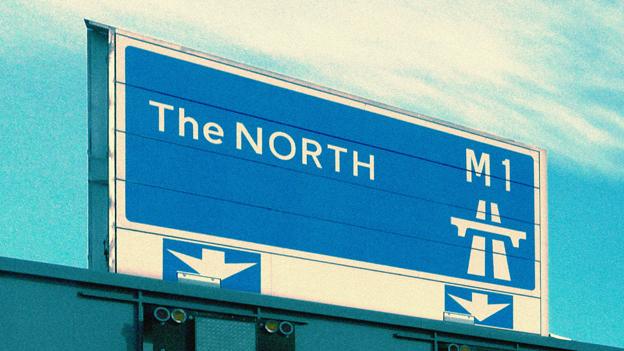
- Published8 January 2015
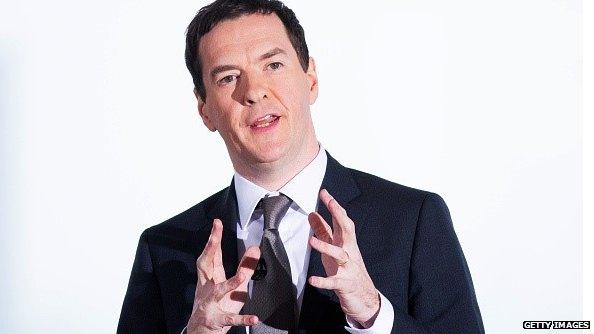
- Published3 November 2014
